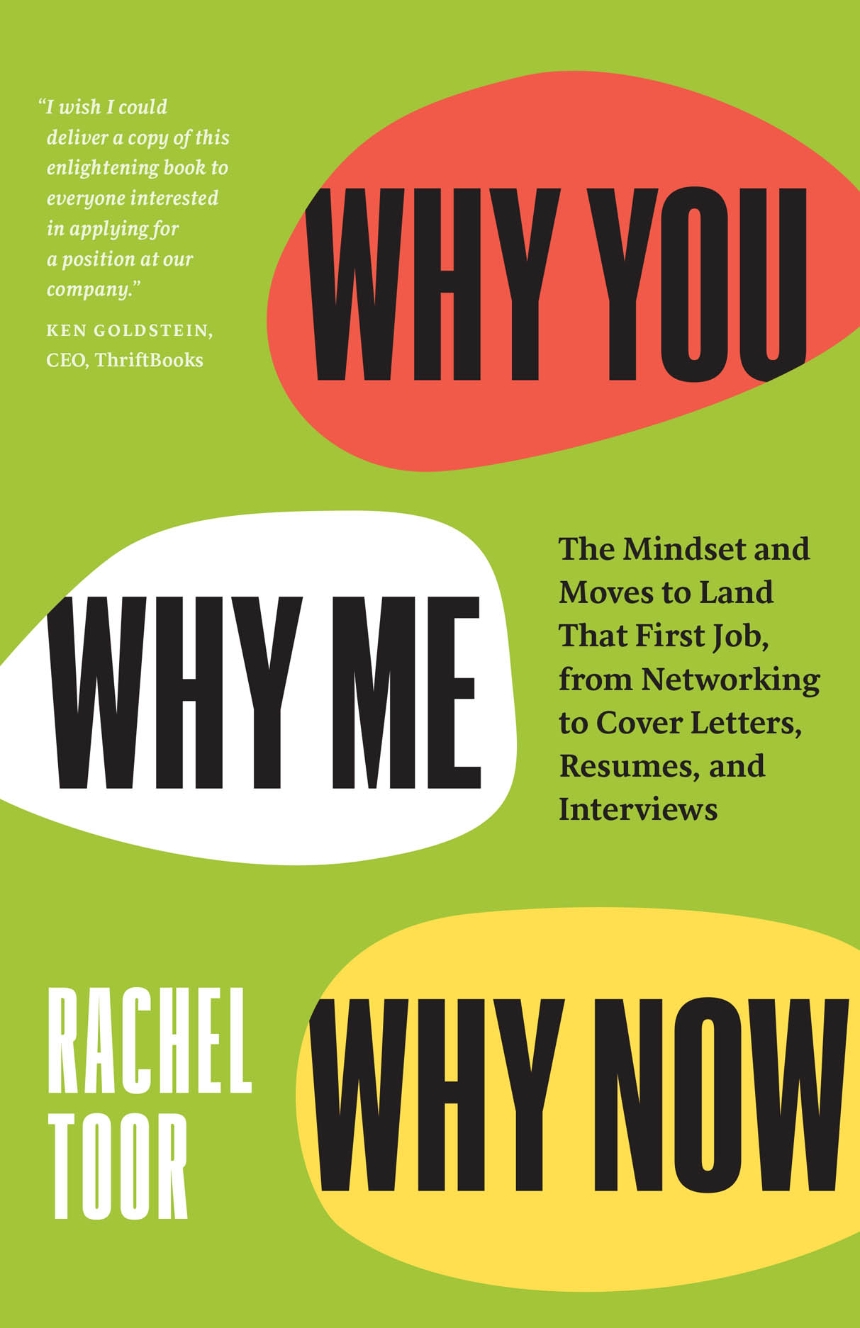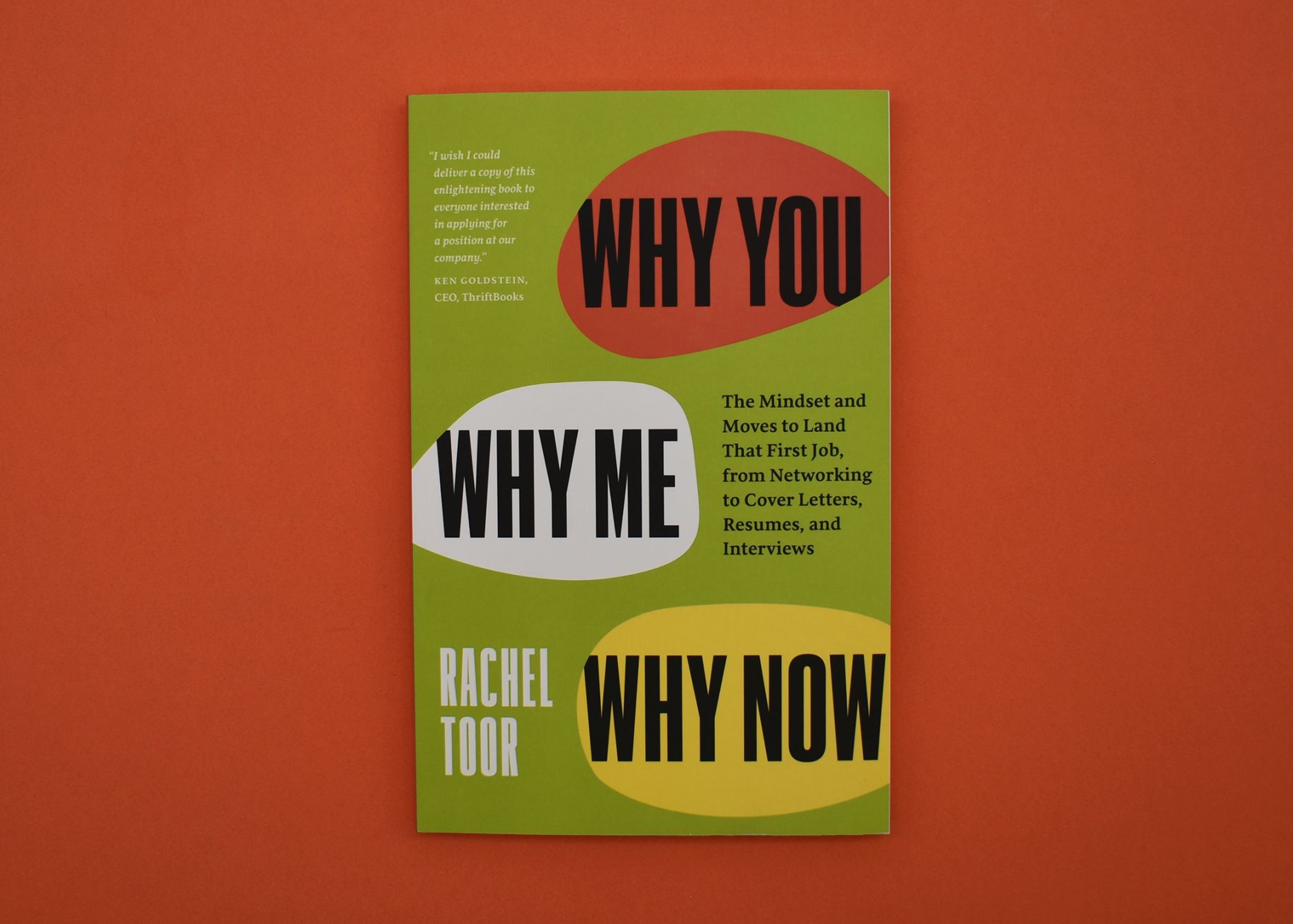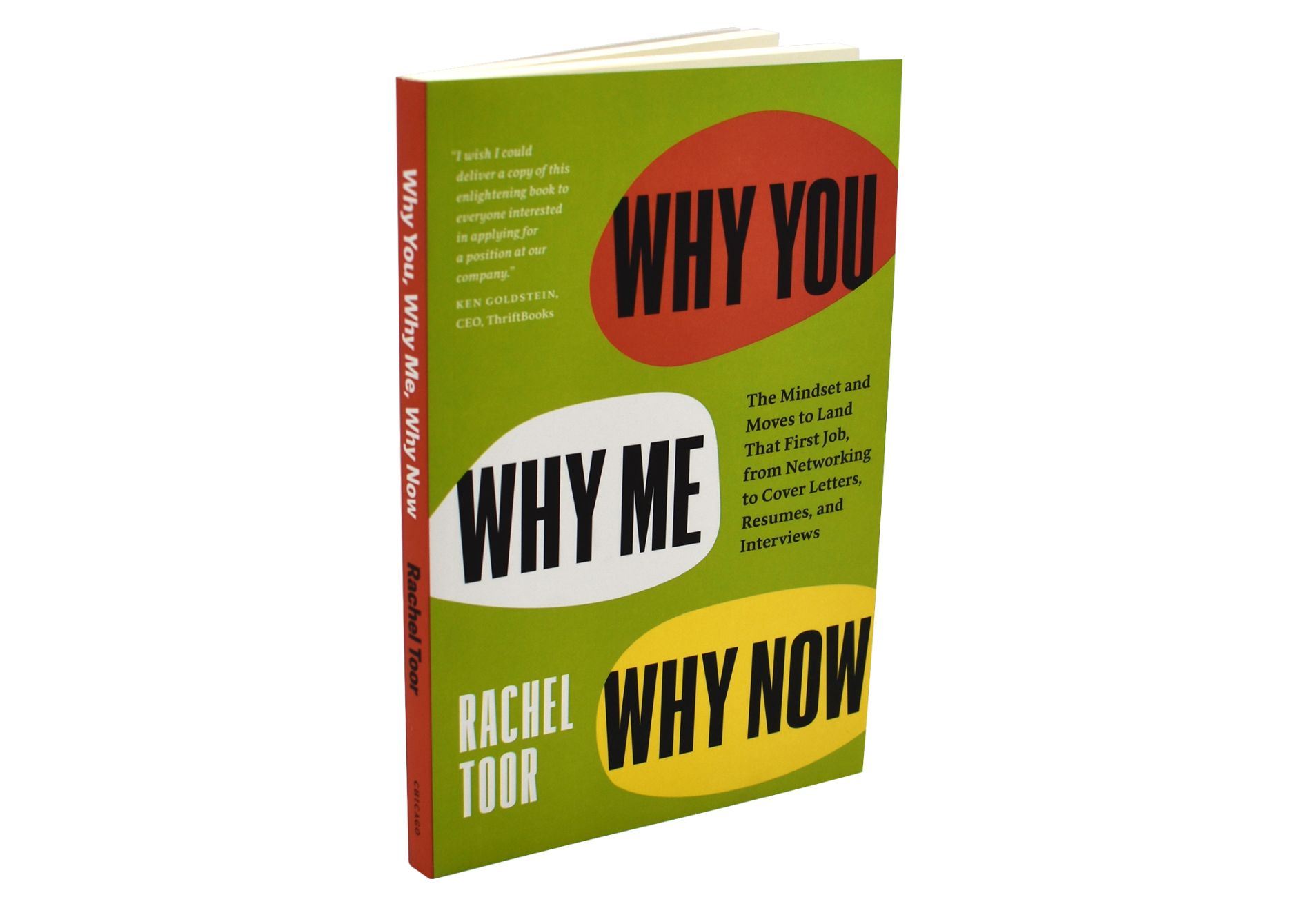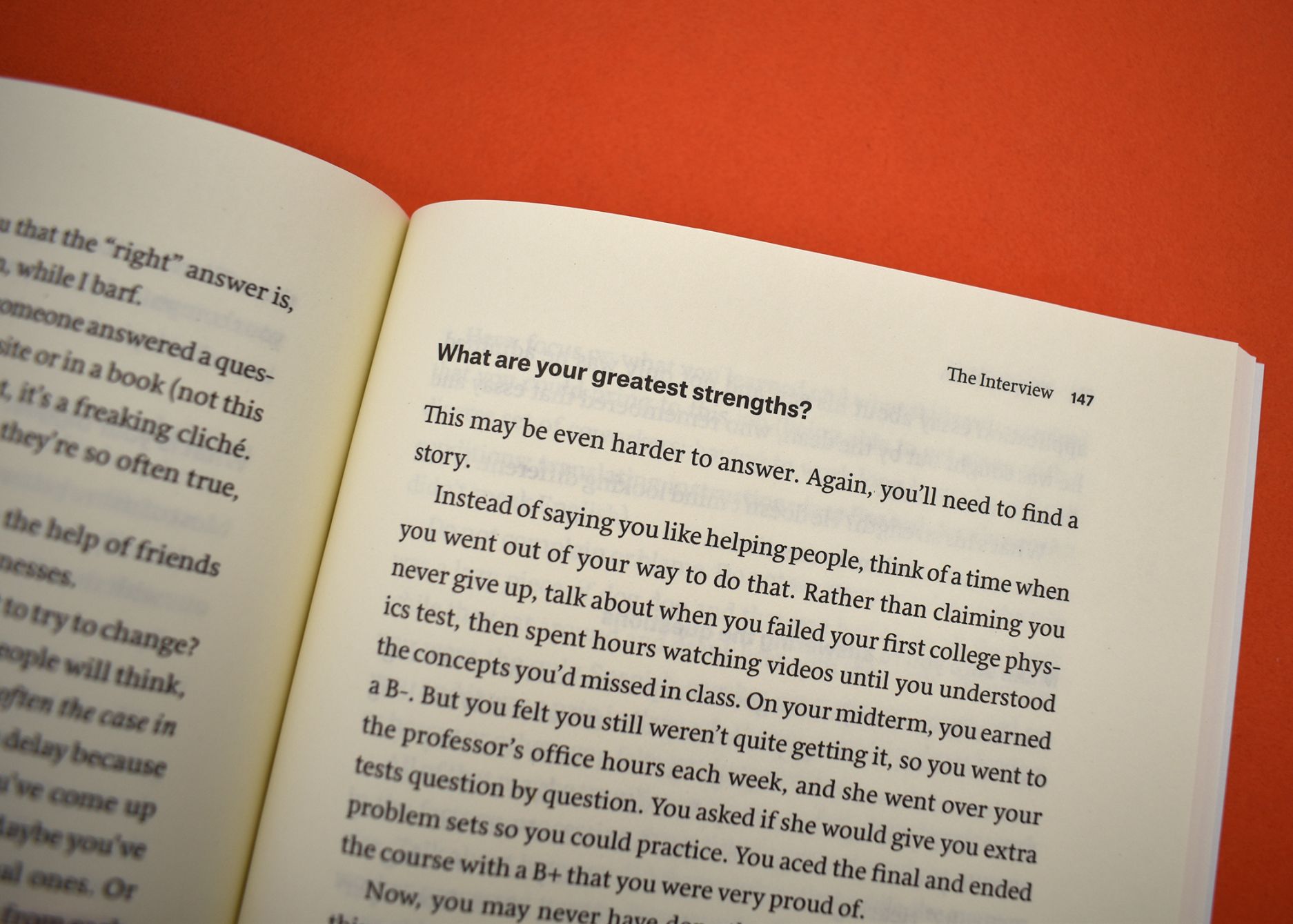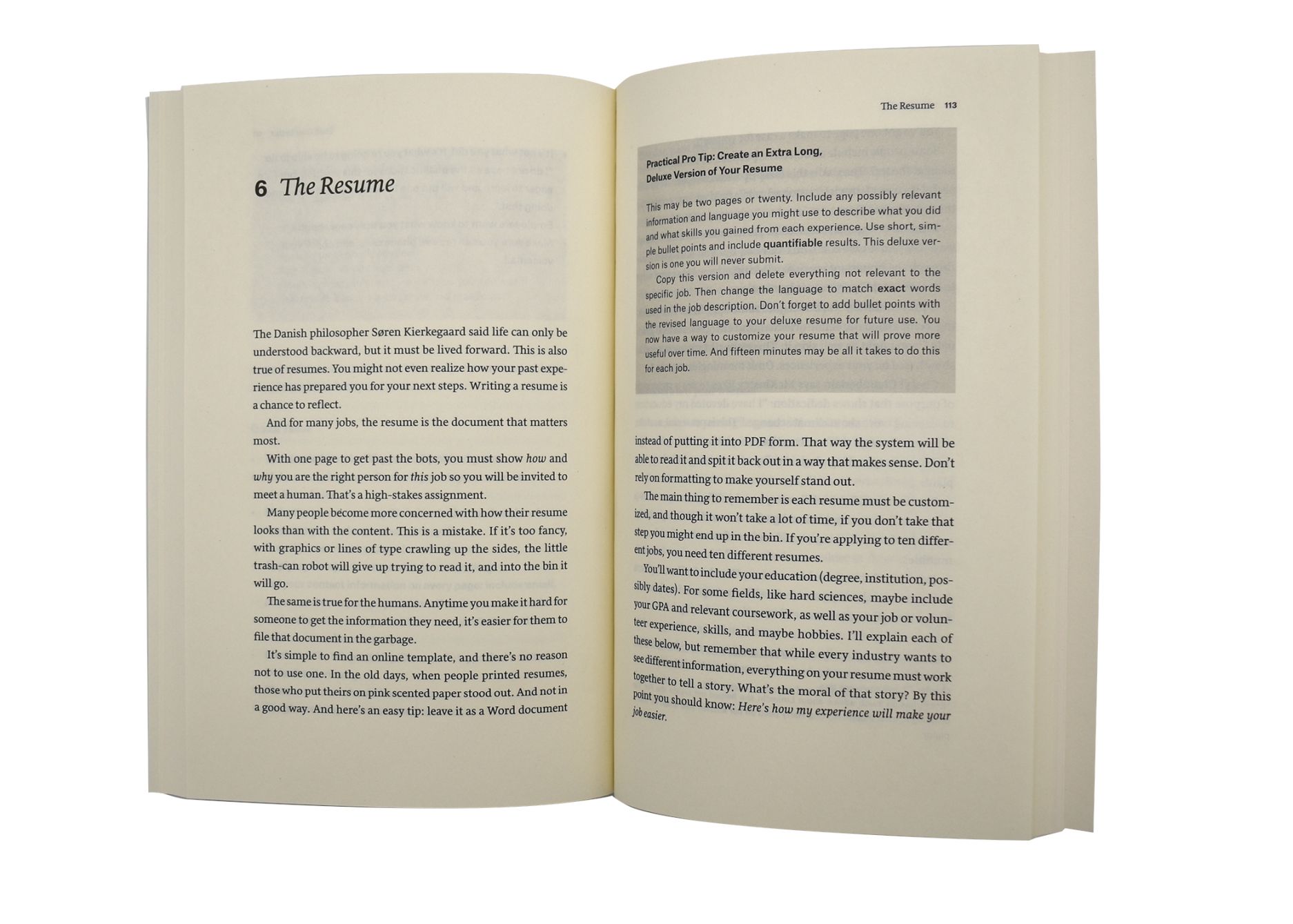Why You, Why Me, Why Now
The Mindset and Moves to Land That First Job, from Networking to Cover Letters, Resumes, and Interviews
9780226822297
9780226831145
9780226831138
Why You, Why Me, Why Now
The Mindset and Moves to Land That First Job, from Networking to Cover Letters, Resumes, and Interviews
A clear, accessible, and fun guide on everything it takes to land a job.
Searching for a job can be hard and demoralizing work. In Why You, Why Me, Why Now, Rachel Toor delivers some good news. The most important thing is within your control—a mindset that shows you know the goals of the organization you want to work for and that you’re ready and eager to contribute. Toor provides, with compassion and enthusiasm, strategies to make it easy for hiring managers to say “yes.” Through useful and funny anecdotes, she offers advice from professionals across industries and focuses on the attitude applicants can adopt to find success. Revealing traits employers seek, Toor shows how to craft winning cover letters, ways to tailor resumes for each job, and practical tips to get past AI screening. She also explains how to use LinkedIn and gives tips on preparing for interviews. Throughout, the book features Toor’s notes on writing well to help in landing a first job and beyond. Encouraging, entertaining, and blunt, this is a job-search guide like no other.
Searching for a job can be hard and demoralizing work. In Why You, Why Me, Why Now, Rachel Toor delivers some good news. The most important thing is within your control—a mindset that shows you know the goals of the organization you want to work for and that you’re ready and eager to contribute. Toor provides, with compassion and enthusiasm, strategies to make it easy for hiring managers to say “yes.” Through useful and funny anecdotes, she offers advice from professionals across industries and focuses on the attitude applicants can adopt to find success. Revealing traits employers seek, Toor shows how to craft winning cover letters, ways to tailor resumes for each job, and practical tips to get past AI screening. She also explains how to use LinkedIn and gives tips on preparing for interviews. Throughout, the book features Toor’s notes on writing well to help in landing a first job and beyond. Encouraging, entertaining, and blunt, this is a job-search guide like no other.
Reviews
Table of Contents
Excerpt
When my students want me to serve as a job reference, I ask them to show me their cover letters and resumes.
These documents often make me want to weep.
On the page, the intelligent, creative, and talented people I know come off as cocky, self-centered, and just plain unlikable.
How can that be?
When it comes to applying for jobs, my students seem to forget everything I’ve taught them.
So I remind them to use the skills they’ve learned in my creative writing courses to sound more like themselves, to be conversational, and to rely on old- fashioned storytelling in their application materials. I repeat what I say in class: If you can craft a clear, concise, authentic narrative that shows the best, most vulnerable version of yourself in a way that engages the reader, you’ll have the keys to the kingdom. I assure them—often first-gen college students whose parents worried they were wasting time and money studying creative writing—that what they learned in my classes is the most important skill set they could have acquired in college, no matter what profession they want to pursue.
My goal in this book is to teach you some of those same transferable moves and tricks and to nurture a mindset that will assist you in nabbing a first “real” job.
Applying for jobs now is both easier and harder than it’s ever been. Everyone has access to an abundance of information about industries, careers, organizations, friends, strangers—and, with a few clicks, the ability to find embarrassing photos and ill-considered social media rants.
For some time, large organizations have used artificial intelligence “bots” to screen application materials. I will help you tailor what you submit so you won’t be automatically rejected. But the role of AI keeps expanding. AI software can now write your cover letters for you. That may seem like a good idea, and in fact, with a well-crafted prompt, could be useful in generating first drafts. But you will still need to work hard to make sure the prose sounds like you—the person who will show up for an interview.
You can be in direct contact with those far outside your personal circle by connecting on LinkedIn or sliding into their DMs. But that doesn’t mean everyone will respond. When I read my students’ cover letters, I cringe at the sterile, generic prose that disguises the lovely, quirky people I know. It’s like they’ve put on an older relative’s uncomfortable suit that reeks of cigars and musty cologne. I also see lots of avoidable mistakes. Based on their application materials, I can’t imagine why anyone would invite them for an interview, and it breaks my heart.
Advice on finding and applying for jobs is plentiful, but it tends to focus on format (the form for a cover letter, a template for a resume). What I provide here you might not find as readily— advice on the attitude you should bring to those difficult rhetorical tasks.
I won’t be dispensing information you can easily google (checklists, spreadsheets to keep track of your job search, time management strategies) or learn at your campus career center (how to discover if a workplace is toxic, whether to cover your tats or remove
your nose ring for an interview, what to expect in a negotiation). Instead, this book is about the mindset that leads to success in the job search. I want to help you think about your job search—who you are, what you value, and how to channel Goldilocks to find a job that’s “just right”—and then show you how to convey those things in your written materials and your interactions with potential employers.
___
The reader I have in mind— the “you” I address—is a recent or soon- to- be college grad. But the advice I’ve gathered from experts holds true for many others. I hope this book will be useful to parents who want to help their children and to professors who understand that part of our work should include helping students get ready for careers. While my focus is on snagging first jobs, the fundamentals of communication also hold true for seasoned executives seeking new leadership positions.
___
I want to help you think about what you need to be successful in the job search. The title of the book offers a formula to address potential employers. Tell them why you are interested in working for them (why you). Then tell them how, based on your attitude and experiences, you can help and support their mission (why me). You might initially get the order wrong and want to put yourself first. That’s understandable. But if you think about it for
a moment, you’ll realize it’s kind of rude to barge in with a self-interested
approach. And putting you before me will set you apart as an applicant. And finally, emphasize how ready you are to try to contribute (why now).
It goes to the main thing I want to help you with: how to present yourself— as respectful, eager, and curious or, in the words I’ve heard tons of employers use, humble, hungry, and smart. I’ll define the attributes employers say they’re looking for and teach you how to present them on the page.
But first I’ll show you a bunch of mistakes you may not even know you’re making.
These documents often make me want to weep.
On the page, the intelligent, creative, and talented people I know come off as cocky, self-centered, and just plain unlikable.
How can that be?
When it comes to applying for jobs, my students seem to forget everything I’ve taught them.
So I remind them to use the skills they’ve learned in my creative writing courses to sound more like themselves, to be conversational, and to rely on old- fashioned storytelling in their application materials. I repeat what I say in class: If you can craft a clear, concise, authentic narrative that shows the best, most vulnerable version of yourself in a way that engages the reader, you’ll have the keys to the kingdom. I assure them—often first-gen college students whose parents worried they were wasting time and money studying creative writing—that what they learned in my classes is the most important skill set they could have acquired in college, no matter what profession they want to pursue.
My goal in this book is to teach you some of those same transferable moves and tricks and to nurture a mindset that will assist you in nabbing a first “real” job.
Applying for jobs now is both easier and harder than it’s ever been. Everyone has access to an abundance of information about industries, careers, organizations, friends, strangers—and, with a few clicks, the ability to find embarrassing photos and ill-considered social media rants.
For some time, large organizations have used artificial intelligence “bots” to screen application materials. I will help you tailor what you submit so you won’t be automatically rejected. But the role of AI keeps expanding. AI software can now write your cover letters for you. That may seem like a good idea, and in fact, with a well-crafted prompt, could be useful in generating first drafts. But you will still need to work hard to make sure the prose sounds like you—the person who will show up for an interview.
You can be in direct contact with those far outside your personal circle by connecting on LinkedIn or sliding into their DMs. But that doesn’t mean everyone will respond. When I read my students’ cover letters, I cringe at the sterile, generic prose that disguises the lovely, quirky people I know. It’s like they’ve put on an older relative’s uncomfortable suit that reeks of cigars and musty cologne. I also see lots of avoidable mistakes. Based on their application materials, I can’t imagine why anyone would invite them for an interview, and it breaks my heart.
Advice on finding and applying for jobs is plentiful, but it tends to focus on format (the form for a cover letter, a template for a resume). What I provide here you might not find as readily— advice on the attitude you should bring to those difficult rhetorical tasks.
I won’t be dispensing information you can easily google (checklists, spreadsheets to keep track of your job search, time management strategies) or learn at your campus career center (how to discover if a workplace is toxic, whether to cover your tats or remove
your nose ring for an interview, what to expect in a negotiation). Instead, this book is about the mindset that leads to success in the job search. I want to help you think about your job search—who you are, what you value, and how to channel Goldilocks to find a job that’s “just right”—and then show you how to convey those things in your written materials and your interactions with potential employers.
___
The reader I have in mind— the “you” I address—is a recent or soon- to- be college grad. But the advice I’ve gathered from experts holds true for many others. I hope this book will be useful to parents who want to help their children and to professors who understand that part of our work should include helping students get ready for careers. While my focus is on snagging first jobs, the fundamentals of communication also hold true for seasoned executives seeking new leadership positions.
___
I want to help you think about what you need to be successful in the job search. The title of the book offers a formula to address potential employers. Tell them why you are interested in working for them (why you). Then tell them how, based on your attitude and experiences, you can help and support their mission (why me). You might initially get the order wrong and want to put yourself first. That’s understandable. But if you think about it for
a moment, you’ll realize it’s kind of rude to barge in with a self-interested
approach. And putting you before me will set you apart as an applicant. And finally, emphasize how ready you are to try to contribute (why now).
It goes to the main thing I want to help you with: how to present yourself— as respectful, eager, and curious or, in the words I’ve heard tons of employers use, humble, hungry, and smart. I’ll define the attributes employers say they’re looking for and teach you how to present them on the page.
But first I’ll show you a bunch of mistakes you may not even know you’re making.
